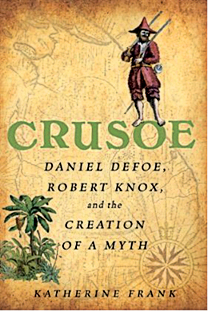REVIEW: Crusoe: Daniel Defoe, Robert Knox and the Creation of a Myth
Book by Katherine Frank
Share
 One of the most charming aspects of Wilkie Collins’s The Moonstone (1868), generally regarded as the first English detective novel, is the way the kindly old steward Gabriel Betteredge, when troubled by doubt or anxiety, would turn to his Robinson Crusoe and invariably find a passage that soothed his worries or bucked him up. Crusoe has been entrenched for so long in our cultural DNA—its 1,000-plus direct descendants, known collectively as Robinsonades, include TV shows like Lost and novels, like Gulliver’s Travels, that are classics in their own right—that we have forgotten Daniel Defoe’s novel once functioned not just as a grand adventure tale, but as a kind of secular Bible. From its 1719 publication, writes Frank, Defoe’s true hold on his readers has been his gospel of positive thinking: face up to your circumstances however grim, work hard to improve them, count your blessings rather than your sorrows, keep the faith and muddle through.
One of the most charming aspects of Wilkie Collins’s The Moonstone (1868), generally regarded as the first English detective novel, is the way the kindly old steward Gabriel Betteredge, when troubled by doubt or anxiety, would turn to his Robinson Crusoe and invariably find a passage that soothed his worries or bucked him up. Crusoe has been entrenched for so long in our cultural DNA—its 1,000-plus direct descendants, known collectively as Robinsonades, include TV shows like Lost and novels, like Gulliver’s Travels, that are classics in their own right—that we have forgotten Daniel Defoe’s novel once functioned not just as a grand adventure tale, but as a kind of secular Bible. From its 1719 publication, writes Frank, Defoe’s true hold on his readers has been his gospel of positive thinking: face up to your circumstances however grim, work hard to improve them, count your blessings rather than your sorrows, keep the faith and muddle through.
Which makes it all the more fascinating that Defoe, whose earlier self-help books included The Family Instructor (dealing with unruly children) and Conjugal Lewdness (sex in marriage), found it much easier to dish out honest-living advice than to act on it. He published his great work anonymously—hardly surprising, given Defoe rented his home under an assumed name and was often on the run, all in aid of evading creditors. (Not that he was always successful: in 1703 alone, Defoe was sent to the public pillory three times.) And when a second publisher was hauled into court for producing a pirate Crusoe edition, the man indignantly claimed that Defoe had sold him the rights too.
One matter Defoe, a congenital plagiarist (usually of his own earlier works), was reticent on was his sources for Crusoe. They ranged from Homer’s Odyssey to memoirs of his own day, including Robert Knox’s account of his 20-year captivity in Sri Lanka, which was full of eerily similar incidents. Comparing, contrasting and weaving together the tumultuous lives of Knox, Defoe and Crusoe himself, Frank has opened a window on the origins of one of Western civilization’s most enduring stories.